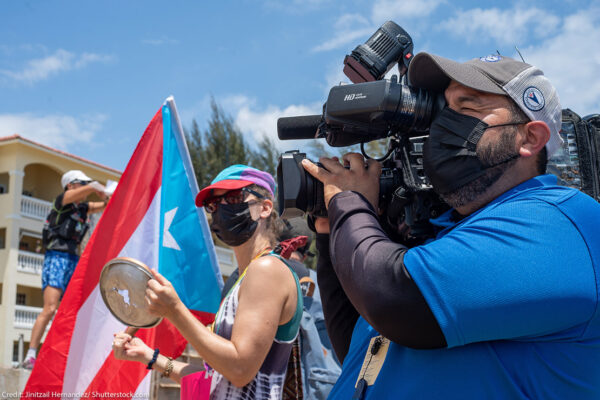ACLU Challenges GA Prison's Claim that Cartoon Drawn By Student Could Incite Racial Violence
FOR IMMEDIATE RELEASE
ATLANTA--The American Civil Liberties Union of Georgia today filed a lawsuit challenging the censorship of a cartoon which officials at Calhoun State Prison in Morgan claimed might incite racial violence among prisoners.
The cartoon, drawn by a 15-year-old girl who later won an award for her work, was a commentary on racial prejudice that accompanied an article on a lynching in a prison newsletter.
"I've never seen prison officials so afraid of a cartoon drawn by a teenager, and I've never heard of a cartoon spurring racial violence," said Robert L. Tsai, Staff Attorney for the ACLU of Georgia.
The cartoon has been published in newsletters and distributed in schools, such as the Boston Public Schools, as well as in prisons around the country. But Calhoun State Prison officials refuse to permit any inmates to receive or read the newsletter.
The controversy centers on Issue 49 of "Freedomways," published by the Prison & Jail Project, a nonprofit organization dedicated to exposing inadequacies in the criminal justice system and improving the conditions of prisoners in Southwest Georgia.
The cartoon appeared next to an article on the lynching of Maceo Snipes, an African-American resident of Rupert, Ga. who served his country honorably during World War II. Snipes returned to Georgia in 1946 and became the first black to vote in Taylor County since the Reconstruction Era. The day after he lodged his vote, he was lynched to death.
The cartoon depicts seven men with their heads bowed and nooses around their necks. The Confederate Battle Flag is emblazoned across the men, and the slogan "Southern Heritage" appears around the image.
Hannah Jukovsky, who drew the cartoon as a 15-year-old white high school freshman, said it was a statement against racial violence and the continued glorification of the Confederate Battle Flag. She said she hoped people of all races and backgrounds would meditate on America's struggles with race and equality and search for solutions, without forgetting that for many people of color, "Southern heritage" has meant terror and oppression.
Jukovsky was recently awarded the prestigious 2001 "Women Who Dared" Award by the Jewish Women's Archive of Boston, Massachusetts, for student activism.
"The First Amendment protects artistic and political expression, especially when it may lead people to reflect on historical matters and current controversies, such as the proper place for the Confederate Flag," said the ACLU's Tsai.
Prison & Jail Project Director John Cole Vodicka, who also edits "Freedomways," said the Calhoun prison officials' actions were "fraught with ironies."
"The newsletter that was denied to Calhoun State prison inmates was allowed into every other Georgia prison," he noted. "And prison officials certainly ought to know that when violence does occur in our prisons, it is almost always because of overcrowding and mistreatment that deny prisoners their human dignity, and draconian sentencing policies that deny prisoners any hope. An historically accurate cartoon in an eight-page newsletter will not foment prisoner unrest."
Tsai added, "Racial oppression and an obsession with the Confederacy are elements of American history, no matter how much prison officials may try to suppress them. We are hopeful that the court will agree with us that this cartoon, drawn by such a gifted and accomplished student, should not have been censored by the prison."
A legal complaint in the case is available online at http://archive.aclu.org/court/vodicka.pdf.


